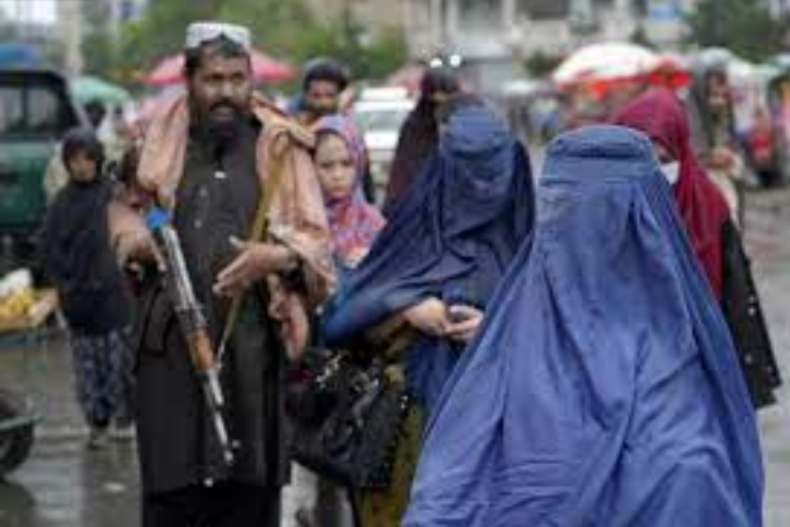Afghanistan’s Taliban authorities issued an order requiring all Afghan women to wear head-to-toe gear in public, confirming the worst concerns of human rights campaigners and further complicating Taliban relations with an already mistrustful international community.
The edict states that women should only leave the house when absolutely necessary, and those families who violate the dress code for women would face punishments ranging from summons to court hearings and jail time.
It was the most recent of a series of restrictive decrees issued by the Taliban leadership, not all of which have been carried out. For instance, the Taliban prohibited women from travelling alone a month ago, but after a day of resistance, this has been quietly disregarded.
The United Nations Assistance Mission in Afghanistan expressed grave worry about what seemed to be a formal instruction that would be adopted and enforced and stated it would seek clarity from the Taliban over the decision.
“This decision contradicts numerous assurances provided to the international community by Taliban representatives during discussions and negotiations over the past decade regarding the respect and protection of the human rights of all Afghans,” UNAMA’s statement.
The regulation, which requires women to conceal all except their eyes and suggests that they wear the full burqa, evokes similar restrictions on women imposed by the Taliban between 1996 and 2001.
“We want our females to live in safety and dignity,” stated Khalid Hanafi, minister of vice and virtue for the Taliban.
Previously, the Taliban chose against reopening schools to females in grades seven through twelve, reneging on a commitment and choosing to placate their hard-liner supporters at the price of further alienating the international world. However, this edict lacks widespread support from the leadership, which is divided between pragmatics and hardliners.
This decision hindered the Taliban’s efforts to get recognition from possible international benefactors at a time when the country’s humanitarian situation is increasing.
“All Afghan women must wear the hijab, and the best hijab is the Chadori (the head-to-toe veil), which is part of our culture and is respectable,” said Shir Mohammad, a vice and virtue ministry official, in a statement.
“Those who are neither too old nor too young must hide their features save for their eyes,” he said. “Islamic principles and Islamic philosophy are of the highest significance to us,” Hanafi remarked.
Heather Barr, a senior researcher on Afghanistan for Human Rights Watch, urged the international community to maintain concerted pressure on the Taliban. It is long past time for a strong and strategic response to the Taliban’s increasing assault on women’s rights, she said.
The Taliban was overthrown in 2001 by a U.S.-led coalition for harboring al-Qaida leader Osama bin Laden and returned to power last year following America’s messy withdrawal.
The White National Security Council criticized the Taliban’s Saturday order and requested them to change it immediately.
“We are now working with other nations and partners to address this issue. According to a statement from the United Nations, the Taliban’s credibility and support from the international community is dependent on their behavior, particularly their ability to back up their claims with actions. Since assuming control in August of last year, the Taliban leadership has been bickering as they seek to shift from war to government. It has pitted the pragmatists against the extremists.
A spokesperson for Pangea, an Italian non-governmental organisation that has aided women in Afghanistan for years, stated that the new edict would be especially difficult for them to accept given that they had lived in relative freedom before the Taliban’s takeover.
“Over the past two decades, they’ve had an understanding of human rights, but in a matter of months, they’ve lost it. It’s dramatic to have a life that no longer exists.” Silvia Redigolo said.
Many Afghans are angered by the fact that many Taliban of the younger generation, such as Sirajuddin Haqqani, are teaching their daughters in Pakistan, yet in Afghanistan women and girls have been targeted by the Taliban’s restrictive edicts since they came to power.
Since the return of the Taliban, girls are prohibited from attending education beyond the sixth grade in the majority of the country. The majority of the country’s universities reopen earlier this year, but since assuming control, the Taliban have issued irregular decrees. While a few provinces continued to give education to everyone, the majority of provinces shut down educational facilities for girls and women.
Hashmi stated that the religiously-motivated Taliban regime worries educating girls beyond the sixth grade will alienate its rural base. Private schools and universities have functioned continuously in Kabul, the capital.
Edited By: Khushi Thakur
Published By: Mohammed Anees













